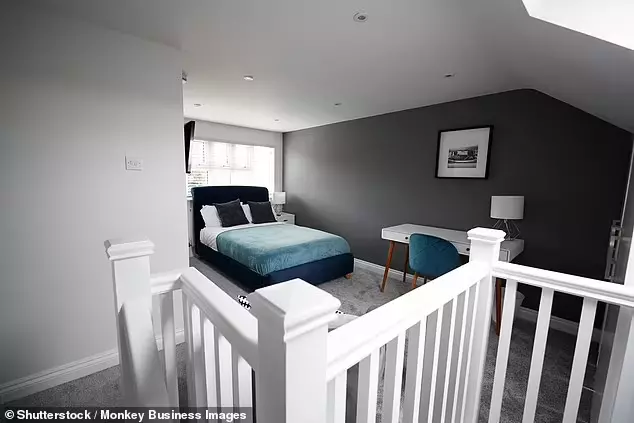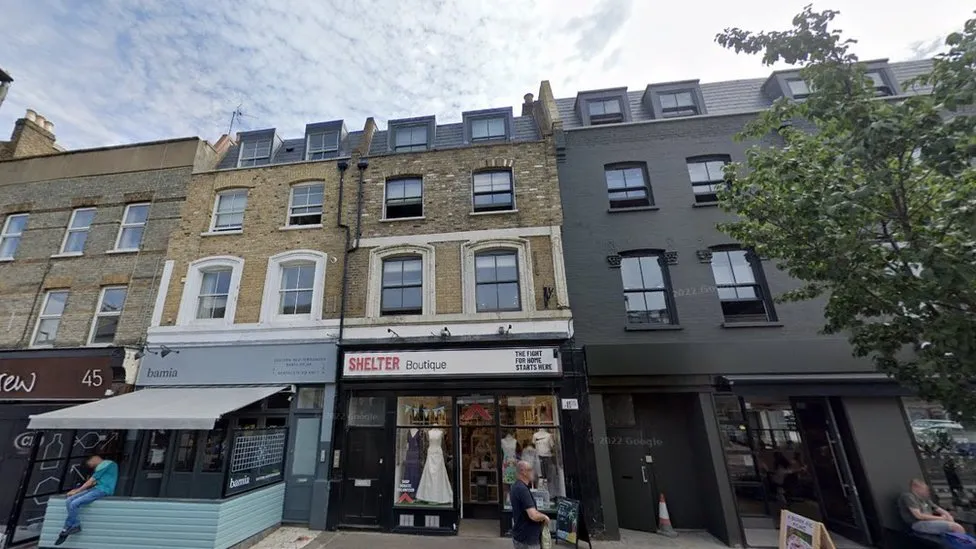
- Chancellor Jeremy Hunt set out the measures in the Autumn Statement
- Supporters say it will create more homes, helping first-time buyers and renters
- But others have warned it could create controversy among neighbours
The Government is planning to scrap the need for planning permission for property owners who want to convert a house into two flats.
Chancellor Jeremy Hunt announced the plan in the Autumn Statement as part of a package aimed at slashing red tape and increasing the number of new homes.
The new rule, known as a ‘permitted development right,’ will apply so long as the external appearance of the building does not change.
But the idea has already proved controversial.

Supporters believe it could lead to a greater supply of homes for both renters and homeowners, helping to combat increasingly unaffordable house prices and rents.
However, some worry that removing the need for sign-off from the local council could have a detrimental impact on communities, changing the character of neighbourhoods forever without giving residents their say.
We explain how the new system could work, and ask property experts for their thoughts on whether or not it is a good idea.
Peter Bill, co-author of Broken Homes: Britain’s Housing Crisis: Faults, Factoids and Fixes, says there will be pros and cons if the proposals are implemented.
‘Cutting red tape for those looking to convert is a good idea and should result in a marginal increase in the number of flats available.
‘The downsides are the inevitable parking problems, and the worries of long-term owners.
‘They may be thinking, “Will these new people affect the tone of the neighbourhood, and bring down the price of my house?”‘
What are permitted development rights?
In essence, permitted development rights cover the most significant changes someone can make to a home without needing planning permission.
The rules of permitted development are set by central Government, and they vary depending on whether you are in England, Wales, Scotland or Northern Ireland.
Local authorities can also make amendments to permitted development rights within their areas, which means planning permission may be required for an extension in one place, and not in another.

It is also important to note that permitted development rights which apply to many common projects for houses, do not always apply to flats or maisonettes.
Paula Higgins, chief executive of the Homeowners Alliance says: ‘Permitted development rights entitle you to extend or renovate your home without the need for a full planning application.’
‘This is a fantastic option for anyone who is looking to avoid the subjective nature of a traditional planning application – not to mention the administration, time and costs involved.’
Why could the plans prove unpopular?
Other notable permitted development rights already in place include the right to extend a building’s height by one or two storeys in some circumstances, and to convert certain office buildings into flats.
Both of these have also been controversial and viewed by some as watering down safeguards to over-development.

Jeremy Leaf, north London estate agent and a former Rics residential chairman believes the Government’s latest proposal could be met with similar condemnation.
He says: ‘This idea is similar to the one where you can build on rooftops – it sounds great in theory but doesn’t suit every area, particularly those where there is a pre-dominance of family housing.
‘While you may not be changing the external appearance of the property, you are changing the culture and making it multi-occupation, which could have a detrimental effect on the community.
‘The character of the area needs to be taken into consideration, along with practical concerns such as the potential increase in parking created by having more households in one property.
‘But on the other hand, in areas where there is a greater mix of accommodation and perhaps a lack of affordable property to rent or buy, it could be a good idea.
‘Whatever is implemented, there needs to be careful control to make sure it doesn’t cause more problems than it solves.
‘We don’t know what right of objection neighbours will have. It is important that there is an objective assessment in terms of parking or the character of the neighbourhood.’
Concerns have also been raised about the quality of the homes created when existing buildings are sub-divided into smaller units, and about the need to retain a supply of larger properties for families who need them.
Who benefits from permitted development rights?
The proposals will be attractive to some homeowners, landlords and developers as they could make sizeable returns on their investments by converting houses into flats and then selling them on or renting them out.
Although not true of all neighbourhoods, a house divided into two flats will tend to sell or let for more than if it was left as an individual home.
‘Two flats tend to be worth more than a single house, in selected areas,’ adds Peter Bill. ‘The ability to turn a detached home or even big Victorian semis into a pair of apartments without planning permission could work well for the owner or landlord.
‘Squeezing two pokey flats into a terraced house can also be profitable, as a legion of landlords can testify.’

The changes could also be beneficial for both renters and aspiring first-time buyers.
There are growing concerns that the rental market is suffering from a severe housing shortage.
There are roughly 4.6 million households within the private rented sector, according to Government figures, representing 19 per cent of all households in England.
Meanwhile, the social housing sector is made up for a further 4 million households representing 17 per cent of the housing stock.
In recent years, more private landlords have been exiting the market than entering it, all the while demand from renters is increasing.
By the end of this year, private landlords will have sold almost 300,000 more homes than they have bought since 2016, according to analysis by the estate agent Hamptons.
This is putting upward pressure on rents. In the last three years between October 2020 and October this year, the average UK rent has risen by almost 32 per cent from £974 a month to £1,283, according to the Homelet Rental Index.
Leaf says: ‘In the right areas and circumstances, the new permitted development right will potentially provide more affordable accommodation which is in such short supply to rent.
‘This should help keep prices and rents in check so if properly controlled, it will be a good idea.
‘It was always that way anyway with conversions but it remains to be seen what difference this proposal will make.
‘It should alleviate pressures on housebuilding and provide a greater supply of property for rent, particularly smaller, affordable properties, which are in short supply.’

Meanwhile, barriers to becoming a homeowner remain high, with first-time buyer mortgage lending down by almost a quarter in the last year, according to UK Finance.
Earlier this year Leeds Building Society revealed that 426,000 fewer first-time buyers would be able to buy their first home over the next 5 years compared to the past 40-year average if current economic projections play out.
If it becomes easier for homeowners, landlords and developers to divide a house into flats this could benefit the buyers alongside renters.
Henry Pryor, a professional buying agent, welcomed the proposals.
‘It’s actually quite a clever idea,’ says Pryor. ‘Increase the housing stock without actually building anything new.
‘Does it solve all our problems? No, it doesn’t – but like converting commercial buildings – offices in old houses in the High Street for instance – this will make a positive contribution to the housing stock.

‘It may make a significant impact on the supply of available rented properties at a time when they are badly needed.
‘There will doubtless be some chancers who try to take advantage of the initiative, but on balance and perhaps unusually I think that this is a good idea and will make a positive difference to people.
‘Whilst he could and should have done much more for housing I say – two cheers for the Chancellor.’
However, Aneisha Beveridge, head of research at Hamptons believes the changes will have minimal impact.
‘Generally we don’t think this policy will have much of an impact at all,’ says Beveridge.
‘If anything, it’s more likely to provide developers and landlords clarity and scope to split a house into multiple dwellings, which could increase densification for homes in some areas.
‘First-time buyers are unlikely to want to take on the work, particularly given the costs associated with purchasing a larger home and then do the works to divide it up.
‘As always, the devil’s in the detail and it will be interesting to see what the criteria is to keep the façade the same. For many houses, this simply won’t be possible.’
Could it lead to a shortage of larger homes?
There are also concerns that it could lead to a shortage of exactly the type of homes that are currently in short supply.
According to Zoopla, there is currently a larger disparity between supply and demand for three-bedroom homes than any other type of property in the UK.
Zoopla says that this impacts those going from their first home to a larger property, but it also impacts first-time buyers who make up a third of the market.
The average first time buyer is now 34, compared to 30 a decade ago, meaning many now need a family-sized home from the get-go.
Daniel Copley, consumer expert at Zoopla said: ‘We know that three bedroom homes are very popular for families and first-time buyers, but there are simply not enough on the market.’
Jeremy Leaf adds: ‘It could mean fewer larger homes, which is why there needs to be some control.
‘This is what planning offices and local authorities are for. It doesn’t have to be full planning permission, but a bit like with extensions and loft permissions, just some checks and balances.’
When will new permitted development rules come into force?
The policy is set to be consulted on early in the new year and then implemented later in 2024.
Paul Higgins of the Homeowners Alliance says the government doesn’t have a good track record on extending permitted development rights.
‘The quality element can be missing and is too often not up to standard, as we have seen with these office to flat conversions,’ says Higgins.
‘Standards need to be maintained as deregulation in this area does mean a greater risk of bad conversions – for example, minimum space standards are often not adhered to.
‘And unlike when you buy a new home, buyers of these conversions will not be given a warranty.
‘Potential buyers will need to be educated about the risks and an independent survey will be a must.
‘Newly converted flats without planning permission should be required to be subject to more stringent building control checks.’
Original Post from thisismoney.co.uk




